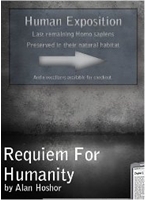

 |  |
Requiem for Humanity
|
Please go to the new Coffee Coaster site implemented more gracefully in Wordpress. This page @ http://brianrwright.com/CoffeeCoasterBlog/?p=2609 |
 This review
comes about from a unique set of circumstances: The author, Alan Hoshor, approached me via my email at the Coffee Coaster with an invitation to read and comment on his short ebook—it is available currently as a Kindle file, and he is in the process of publishing a conventional book via Createspace. The topic is one in which I have a fair interest, namely, 'transhumanism' and what we may expect as biological humankind moves toward the Singularity[1] and beyond. Mr. Hoshor's focus is on the nearer-term ramifications of the transition.
This review
comes about from a unique set of circumstances: The author, Alan Hoshor, approached me via my email at the Coffee Coaster with an invitation to read and comment on his short ebook—it is available currently as a Kindle file, and he is in the process of publishing a conventional book via Createspace. The topic is one in which I have a fair interest, namely, 'transhumanism' and what we may expect as biological humankind moves toward the Singularity[1] and beyond. Mr. Hoshor's focus is on the nearer-term ramifications of the transition.
Another reason for proceeding to the read and review is I had not yet purchased an electronic-book formatted work, and I wished to learn the ropes on how Kindle works for my own publications.[2] Hoshor's book was available from Amazon as a Kindle-formatted ebook for only $2.99—as he put it, "for the price of a specialty latte at Starbucks." It proves to be well worth the expense. Alan is a systems sort of guy who has read widely in the 'transhumanist/posthumanist" field, and cites the latest leaders, or at least celebrities, in the field. From the book 'jacket:'
Alan Hoshor is a long time resident of the Pacific Northwest. Originally trained in Forestry at University of California, Berkeley; he has had a very diverse and eclectic career in industries both large and small. Twelve years ago he started Hoshor Systems Consulting to service small businesses in Washington State. Alan's claim to competence is his capacity for systems thinking matured over decades of productive life.
The introduction Hoshor writes for Requiem is exact and thorough:
The future of humanity is seen by many to be on the cusp of change. Those who predict the future see tomorrow through a lens formed from their education, experience and viewpoints. Bill Joy presages an apocalypse; Ray Kurzweil expects to ride a technologic stairway to heaven; and Jaron Lanier predicts humanity will transcend itself into an unforeseeable future. This book sees the future through the lens of a generalist. I apply critical thinking and realistic application of diverse science into my prophecy for humanity over this century. My hope is to give the general reader a rational context for viewing the changes transforming our world today. It is better to know where the tiger we are riding is headed-if we hope to hold on and maybe even steer.
His systems orientation is apparent from the gitgo. In an early chapter he lays out several such boundary conditions of the potential Singularity problem:
Our social systems are designed to maintain the status quo. Those in power fight to maintain their authority. Societies that maintain cohesion under external threat are more likely to withstand disasters. Our leaders guide us against threats by invoking powerful human emotions like faith, self-protection, pride, and loyalty. Leaders don't try to invoke our higher logical reasoning powers. As a species we fall back on our instincts when stressed. This is a survival technique that has protected us for many thousands of years. We are not about to change. On this question I think the term ‘human nature’ is pertinent. Biologists currently believe that our genes control much of what we are...
The book is approximately 90 pages or so, and it reads well and deeply. Though the author disclaims on his writing abilities—while acknowledging the help of several others in that department—I find the prose flowing and strong. He makes his case, which, although on the pessimistic-as-precautionary side, gives us the benefit of a breadth of understanding of the few guiding lights who have written in the field. For me, the book is a lesson that as a futurist or speculator or one who is concerned about conceptually conscious beings of the near future one needs to not dwell solely on 'familiarity with one great author' for informed thinking. [I have always favored Kurzweil's technical optimism... yet my reading is quite slim compared to where serious and caring students of the future need to be.]
Through an exposition of the writings and statements of major thinkers of the New Age of Biotechnical Humanoid Derivatives—Hoshor's term is technololgy-augmented bioengineered (TAB)—Hoshor describes many of the issues that remain to be addressed as we come onto the threshold. He makes an argument that the near term of human transformation will likely see more turmoil than progress: by looking at scarcity conditions and the state of human consciousness today he finds little to be optimistic about. At the outset, competing species of TAB will naturally create conflict... among one another and between them and the remaining nonaugmented human beings. His analysis encompasses the following subject matter:
Requiem for Humanity is a fine work, an important work. Aside from its author's rather harsh perspective, the book serves as an excellent introduction to anyone thus far innocent of the transhumanist/futurist field. My personal inclination is toward more optimism, as one might see in my review of James Dale Davidson's The Sovereign Individual. For example, I do not think Hoshor has a thorough grasp of politically libertarian solutions—I submit my own Sacred Nonaggression series as one such—nor do I sense a spiritual orientation in his writing that invites answers along the lines of, say, Eckhart Tolle, and a radical transformational, positive shift in still-human consciousness. These advances I do expect to see, and do anticipate in my own 'religion' of reason and liberty: Beism.
Yet no objections and mainly kudos to Mr. Hoshor and his maiden voyage into high waters. I look forward to the print version of Requiem, and to the next edition, which I'm sure will capture several routine editing nits in Job 1.
[1] The Singularity is a term created by <I'm not sure> but popularized by Ray Kurzweil in his book The Singularity is Near: When humans transcend biology. The Singularity refers to a point in time when biological humans merge sufficiently with their technology to become, effectively, a different species. Kurzweil is optimistic that such a development heralds an unfettered future of Intelligence, peace, and 'humaneness'—whatever that may mean in a post-Singularity future. Hoshor does not share Kurzweil's optimistic view.
[2] Kindle works well from the perspective of running the Kindle application on one's PC or Mac, also on the Amazon Kindle reading device and other handheld devices—I believe iPad, for instance, runs the Kindle app. One wrinkle to consider for online readers is that Kindle is a proprietary file format that not all readers (for example the Barnes and Noble 'Nook') will accept. The Nook, in distinction to the Kindle [at least this is my current understanding], reads public standard 'ePub' documents that are often available, say, from one's public library for free.
###
2011 July 01
Copyright © Brian Wright | The Coffee Coaster™
Requiem for Humanity | Alan Hoshor | Futurism | Transhumanism
| Publish Fee: $25 Donation |  |
|||
|
Main | Columns | Movie Reviews | Book Reviews | Articles | Guest |